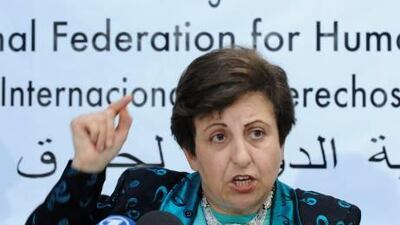When Nasrin Sotoudeh appeared before a Revolutionary Court for the start of her trial in Tehran recently, her frail appearance belied the charge against her: that she was a threat to national security.
The prominent human rights lawyer was emaciated and sunken-eyed after 50 days on a hunger strike in prison.
Her only "crime", according to her supporters, was to defend political prisoners and dissidents, such as the exiled Nobel Peace laureate, Shirin Ebadi, Iran's most celebrated human rights lawyer. Ms Sotoudeh was also, like Ms Ebadi, a leading supporter of women's and children's rights.
But such a profession is now increasingly perilous.
At least 10 human rights lawyers have been detained or sentenced to long prison terms in recent months. Several others have fled Iran.
Amnesty International has accused Tehran of declaring open season on lawyers.
"The waves of arbitrary arrests of lawyers suggest that the judiciary has given carte blanche to the security forces to stop any lawyer whose work or statements get in their way," the organisation said in a statement last week.
Ms Sotoudeh, 47, has been held in solitary confinement since September 4 in the very prison where many of her clients have been held. She was refused permission to attend her father's funeral.
After her closed-door court appearance last Monday, she finally agreed to start eating again following pleas by her family. When her two children visited her recently, she was too weak to hug them.
The serial arrests of lawyers represents an alarming trend in Iran's suppression of dissent. Having jailed scores of protesters, students and journalists after mass show trials in the wake of President Mahmoud Ahmadinejad's re-election last year, authorities are now targeting those who defend the government's critics or take cases that embarrass the regime.
"Working for human rights in Iran now is the equivalent of strapping a bomb to yourself and walking in the streets," Ms Ebadi was quoted in the Wall Street Journal on Friday. "The situation for political prisoners is extremely dire right now."
Ms Ebadi left on a European tour a day before the June 2009 election, to promote a book she had written but, fearing for her safety, has yet to return. She is maligned by the regime as a western lackey, but considered a folk hero by many ordinary Iranians.
In Iran, Ms Ebadi led the Human Rights Defenders Centre, a now disbanded legal-aid organisation that drew the ire of the regime. On October 30, a lawyer who helped establish the centre, Mohammad Seifzadeh, was sentenced to nine years in prison and a 10-year ban on practising law after his release.
While several male lawyers have been targeted, many arrested attorneys in recent months are women. The regime has made clear that it fears the well-organised activism of Iranian women, viewing their demands for equal rights as inseparable from the opposition's drive for greater democracy. The iconic image of Iran's post-election turmoil last year was Neda Agha-Soltan, a student shot dead by a Basij militiaman during a demonstration.
Most of the arrested lawyers are accused of "acting against national security". But the hardline head of Iran's judiciary, Sadegh Larijani, hinted at the real reason for the detentions when he warned lawyers recently about criticising Iran's judicial system and giving interviews to foreign media. The Iranian regime is acutely sensitive to criticism of its human rights record.
When a United Nations' General Assembly resolution accused Iran on Thursday of "serious ongoing" human rights violations - including torture, flogging, amputations and stoning, and what it called "pervasive gender inequality and violence against women" - Iran insisted it was a move "masterminded" by the United States.
Nevertheless, on Friday, Iran invited the UN human rights chief, Navi Pillay, to visit next year. UN human rights monitors have been denied direct access to Iran since 2005.
The lawyers arrested recently represent a dwindling core of courageous attorneys willing to take on sensitive cases. No case has attracted more unwelcome attention for the regime than that of Sakineh Mohammadi Ashtiani, an illiterate mother of two sentenced to death by stoning for alleged adultery. Her plight, which has caused an international uproar, is under review by Iran's supreme court.
One of Ashtiani's lawyers, Mohammad Mostafaei, fled to Norway this summer; another, Javid Houtan Kian, has been detained. Ashtiani's last lawyer, Sara Sabaghian, was arrested on November 12.
She was among five attorneys, four of them women, detained at Tehran's Imam Khomeini airport as they returned from a trip to Turkey. They were accused of "security-related offences and violating the Islamic republic's moral standards outside Iran". Two of the women were freed on Friday.
Like the two still in custody, Ms Sabaghian and Marymam Kianersi, they had signed an open letter in September calling for Ms Sotoudeh's release.
And Ms Sabaghian had represented Hossein Ronaghi-Maleki, a blogger who is serving a 15-year jail term. Ms Kianersi, meanwhile, helped defend Kobra Najjar, a woman who was sentenced to death by stoning for alleged adultery two years ago: her sentence was changed to 100 lashes in January 2009.
Hadi Ghaemi, the New York-based co-ordinator for the International Campaign for Human Rights in Iran, said: "How can there be any semblance of due process for defendants when their lawyer can end up in jail for years simply for doing his job?"

